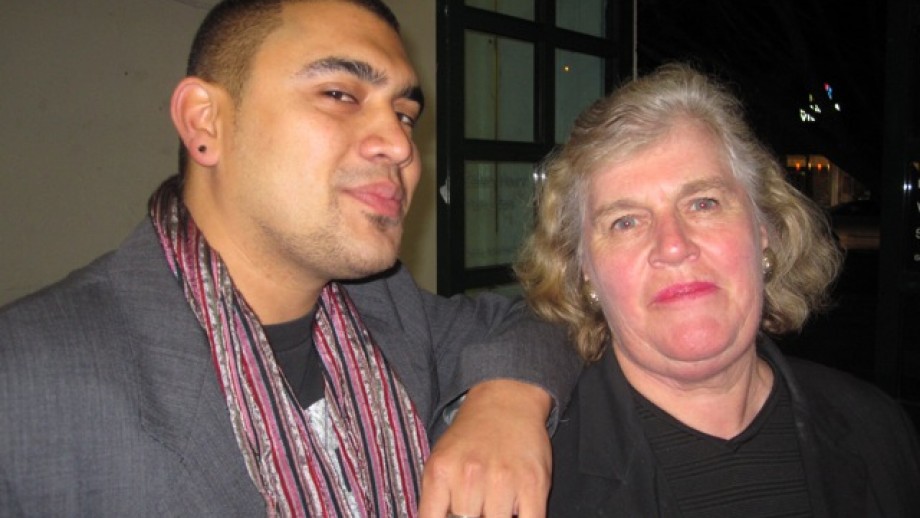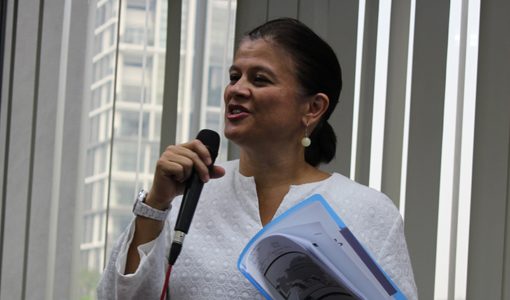Wanita Theatre features interviews with and about Malaysian women working in the theatre, carried out for entries in the Encyclopedia of Women and Islamic Cultures On Line Edition.
- An email interview with Helen Musa 20 March, 2011 (scroll below for bio)
- Posted: Saturday, 23 April 2011
- As seen in: https://wanitatheatre.blogspot.com/2011/04/ann-lee-writer-producer-director.html
Ann Lee, writer, producer, director
I believe that working in Malaysia (as in Indonesia) a “Muslim theatre worker” is obviously defined in terms of their stated religion. But it is useful, I believe, to think in more fluid terms to gain a more nuanced understanding of how Islam may be said to influence a person”s work or themes. As you say, “nonetheless I have been working with women”. Similarly, nonetheless I have been working with Muslims.
Perhaps, like the science of the hadiths, you may need to have various categories for the Encyclopedia – “friends of Muslim theatre workers” or some such! – who may or may not be considered close to the teachings of the Prophet Muhammad (pbuh). I don”t mean to be facetious.
Does my Malaysian IC state that I am a Muslim? No, it doesn’t. But while I may not be defined by state as Muslim, nevertheless, the themes that I am interested in, and the references that I turn to, are also Muslim or from Islam (and/or wash with at the same time “Malaysian” and “Malay”. Pls see a bit more about this in terms of the country”s Constitution below). I”ve been reading the Quran since 1987 when I first received a free copy from ABIM, the dakwah association. I have found reference to this not only useful but actually imperative to help me understand and contribute to the times and society in which I live. I have also tried to read the Bible, Buddhist texts, Hindu, Sikh and other sacred texts.
On another personal note, my partner is Muslim (as was my previous) which means that while I am not officially a Muslim convert, I am fairly steeped in many cultural practices and dimensions that are described as Muslim.
But further of course, one may be a person who is not secular but defines their religion in a very private realm and chooses not to articulate specific personal facts to support one”s faith. Nevertheless we may find themes in their work that are also arguably Muslim, derived from Islam (or also spiritual or religious in a universal sense).
Regarding the social role and cultural importance of women playwrights, actresses, directors, producers and patrons, there are so many in Malaysia but unfortunately no consolidated histories. Still, there are official state bodies (the Ministry of Culture and Information, formerly Ministry of Culture, Arts and Tourism; the universities, but especially noteworthy would be UKM or the National University of Malaysia; and then there are the private universities of which suggest Sunway would be a primary source.) All of these are, however, focused on peninsular Malaysia. The theatre cultures of Sabah and Sarawak also include Muslim theatre workers but are written of even less, though things are improving.
To consider just the playwrights of the last 20 years, here are names I would single out:
1) Playwrights: Including a person who may have written one work for the stage. Or been part of a devised or collaborative work (after all, playwright is only a recent invention as a particularised occupation). This doesn’t include choreographers or “curators” of stage works and installation-like performances that cross the boundaries between dance, movement and text.
- i) Sabera Sheik: she has written a number of plays and works for the stage, and in fact is performing in one of them now Lady Swettenham, for “100Women”, the series of performances and workshops now under www.kakiseni.com.
- ii) Shahimah Idris (also known as Charmaine) wrote From Table Mountain to Teluk Intan with myself, Sue Ingleton and Jo Kukathas, that was produced in 2000 and in 2002 (at invitation of the New York International Fringe Festival) by Kuali Works.
- iii) Solehah Ishak (Dept of Malay Letters, UKM or National University of Malaysia). For a while, she was translating many plays from Malay into English that can perhaps qualify to call her woman playwright. Her translated works include Modern ASEAN Plays-Malaysia (Gen Ed: Zakaria Ariffin and Editors Hajah Ainon Abu Bakar and Zullkeply Mohamad, ASEAN Publishers, 1993); she also written the introduction of this book.
- iv) Rosminah Tahir (Dean at ASWARA): she is mostly a director but has also written her own/adapted works for the stage.
- v) Mira Mustaffa (A Silent Scream and Hero) Dina Zaman (Why did he sleep with me if I”m so fat?), all wrote monologues for “Dramalab One by One” monologues produced in 1995. Dina also wrote “Gula Girls” for the “Talking AIDS” series produced by the Actors Studio and Dramalab in 1999.
- vi) Yasmin Yaacob has written a number of plays, including her first, A Flight Delayed, that was produced in 2000 (produced by Dramalab). The Artistic Director of Dramalab is (Dato”) Zahim Albakri.
2) Patrons: There are many unsung Muslim women who have been working in the private and public sectors in positions of senior and middle management who have brought about sponsorship of new or staged work. Just as one example, I would highlight the late Endon Mahmood, first wife of former Prime Minister of Malaysia, Abdullah Badawi. Her daughter, Nori Abdullah, has also been very supportive.
Re: to what extent Muslim/Malaysian women playwrights reflect their Islamic beliefs in their plays.
I think one”s beliefs and faith are inevitably reflected in one”s works. Same goes here, though none may overtly cite text from the Qur”an or hadiths, so far as I recall. I do understand but I find it rather unhelpful to divide Islamic beliefs from secular, or at least certainly from the personal. As one acclaimed law professor has said about the Malaysian Constitution -= “It may be secular but it is not Godless”. Faith in God is a stated principal principle of the document. Perhaps one should try to calculate the number of atheists in a Muslim majority population. That might add weight to the arguable cliché of secular/Islamic convenience. As you can tell, I chafe under this and perhaps have no right as a non-Muslim, whatever that is: – )
Re: whether these plays have been staged and if so, by male or female directors.
The plays have mostly been staged by male directors. I consider the gender of the director to be relevant, but not necessarily the predominant factor.
Re: any strong or archetypal female characters in modern Malaysian theatre and if so, who are the actresses who have played them?
Modern Malaysian theatre (post-Merdeka/Independence or from the 20th century onwards?) is inextricably linked to many social/political dimensions of the country”s context. Critically, for example, Malay and Muslim are entwined in the Constitution”s definition of a Malay. (Very interestingly, while one as a non-Muslim cannot be a Muslim except by conversion, one may be a Malay and therefore also Muslim by definition). Most of the strong, archetypal female characters are of female Malay warriors/political leaders. Most recently, and most famously, Puteri Gunung Ledang, played by Jacqueline Tiara. I would also include “Hang Li Poh”, typically portrayed as a daughter of the Ming Emperor who was sent as a gift from the Emperor to the Sultan of Melaka (Malacca). However, she was arguably also a Muslim. Certainly, Admiral Cheng Ho or Zheng existed, the astonishingly accomplished sailor of expeditions from China, a Muslim, and also a eunuch. As some legends have it, he brought her to Malacca. Muslims in China were already well known in the Ming era (if not now!)
Also, modern Malaysian theatre may be said to flow in distinct streams, depending on language – Malay (Bahasa Malaysia or Bahasa Melayu), the official language, but also Chinese (various dialects) and Indian (mostly Tamil) and other “Other” languages.
Re: there are some stereotypes of women in modern Malaysian theatre and are they being challenged.
I would say Modern Malaysian theatre, in the last 20 years, has been very taken up with issues about sexuality and gender, and challenging them. However, religion remains a very sensitive issue, particularly for any works in Malay that may challenge officially approved tenets. English language theatre has been the most overtly provocative but this has been allowed, arguably because it is a language of the elite and not therefore the main powerbase of the ruling party.
The story of how Eve Ensler”s The Vagina Monologues was produced in Malaysia – one version produced by Five Arts Centre (directed by Hari Azizan, a woman director/performer who has staged a number of works now) and another produced by AWAM, the All Women”s Action Society of Malaysia (directed by me) would be an obvious but revealing case study as to how far stereotypes about women may be challenged, irrespective of language, in Malaysia.
Re: who are the audiences who attend these plays?
Largely urban and middle class.
Ann Lee
March 11, 2011
The interview was conducted via email for the Wanita Theatre blog. Helen Musa is an arts and cultural journalist and editor with a special interest in contemporary theatre and the culture of Southeast Asia and the Islamic world. During the 1970s and 1980s, she taught theatre at the University Sains Malaysia in Penang, Malaysia, where she also directed the university theatre and staged the first Malay language production of Hamlet. She has been the convenor of the Canberra Critics Circle since 1991. Arts editor for the Citynews Canberra and a consultant to the Asia Pacific Journalism Centre.



